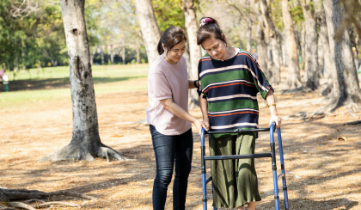NDIS Therapeutic Support for Neurological Conditions
Mobile Exercise Physiology, Dietetics and Physiotherapy
Active Ability’s experienced allied health team offers mobile therapy services for people with neurological conditions throughout Sydney, Wollongong and the Sunshine Coast.
Our skilled, friendly therapists are dedicated to helping people with neurological disorders achieve better health, function, and quality of life.
We have extensive experience working with individuals living with
- Multiple sclerosis
- Cerebral palsy
- Spinal cord injuries
- Guillain Barre syndrome
- Parkinson’s disease
- Dementia
- Motor neurone disease
- Huntington’s disease
- Stroke
- Acquired and traumatic Brain Injuries
- Muscular dystrophy
- Fibromyalgia
- Peripheral neuropathy
- Chronic fatigue syndrome
- Epilepsy
- Other neurological disorders
Neurological disorders can result from diseases or injury to the brain, spine and the nerves connecting them. When the nerves that control movement and/or sensation are affected, activities such as walking, exercising, eating and personal care can become difficult.
NDIS therapeutic supports with Active Ability can help improve or manage the physical effects of neurological disorders, so you can be more independent and participate at home, work and in your community.
As a mobile NDIS service provider, our therapists can see you at your preferred location. We don’t have a waiting list, so you can get started with therapy as soon as you need it.
Give us a call or check out our client stories to see if we can help you! If you’d like to get started with services, fill out our NDIS referral form below.
hidden
Mobile Allied Health for People with Neurological Disorders

Nutrition for Neurological Conditions
Neurological conditions and their associated medications can come with many symptoms or side-effects that affect oral intake and nutrition status. These can include neuropathic pain, loss of appetite, fatigue, nausea/vomiting, early satiety, constipation, reduced gut motility and dysphagia (reduced swallow function).
Some neurological disorders can mean you’ll need extra support to manage your oral intake and achieve ideal nutrition, such as a texture-modified diet or PEG feeding.
Dietetic counselling, education and management can provide tailored advice to optimise nutrition and design a healthy diet for people with neurological conditions. Maintaining optimal nutrition is vital for:
- Counteracting nutritional impact of neurological symptoms
- Retaining muscle mass and strength
- Improving energy levels
Support in these areas can improve your quality of life, independence and general health and wellbeing.
Active Ability’s dietitians are trained in motivational interviewing and client-centred care to achieve the best client involvement and outcomes.
We have experience providing services to clients with neurological conditions in both private and assisted-living settings. Dietitians can provide nutrition status assessments, staff training, menu planning, individualised goal setting for diet optimisation and client-centred education.

Exercise for Neurological Conditions
Balance and strength are often affected in neurological conditions. Exercise physiologists provide tailored exercise programs for people with neurological disorders. Targeted exercise can improve strength and reduce functional decline, while considering the needs associated with your condition, such as managing fatigue levels.
An exercise program for neurological disorders may focus on:
- Progressive resistance training to improve muscle strength, with an emphasis on functional movements (eg standing from a chair and walking)
- Increasing lower limb balance and coordination to reduce falls risk, and consequent risk of injury/fracture.
- A combination of static and dynamic stretching (either actively or passively) to reduce muscular stiffness and increase mobility for ease of task completion.
- Aerobic training to improve functional endurance, lung and heart function, and reduce risk of chronic disease associated with a sedentary lifestyle.
Muscular stiffness is a common symptom of neurological disease due to an imbalance of electrical signals coming from the brain and spinal cord. Stretching of spastic or contractured muscle groups allows for strengthening of the opposing muscle groups, which often have reduced activity and therefore reduced strength and function. For example, quadriceps and hip flexors are often tight, which inhibits hamstring and gluteal activity, resulting in hamstring and gluteal weakness.
Active Ability’s exercise physiologists can design and help you put in place an exercise program tailored to your needs and goals, to help maintain your independence in completing activities of daily living for as long as possible.
Adhering to exercise can lead to:
- Decreased risk of falls and decreased reliance on mobility aids
- Improved ability to walk
- Improved lower limb strength
- Maintenance of muscle mass
- Overall independence in accessing the community

Physiotherapy for Neurological Disorders
As experts in movement and function, physiotherapists are qualified to assess and manage the physical signs of neurological conditions, such as impaired mobility, balance, posture and dexterity.
They can manage high muscle tone and the secondary impacts of neurological disorders, such as pain and stiffness and breathing problems. They may also be involved in your recovery after an injury.
Neurological physiotherapy aims to improve function, support your independence and/or minimise functional decline
Examples of physio services include:
- Exercises aimed at improving walking, balance, arm function, hand dexterity and coordination
- Management of lung function including airway clearance techniques and breathing exercises
- Vestibular assessment and rehabilitation
- Management of acute or chronic pain and stiffness
- Sensory-motor integration training
- Education and advice on symptom management
- Fatigue management
- Assessment and training in the use of mobility aids
Active Ability’s experienced physios will discuss your medical history, assess your function and talk to you (and your support people) about your therapy needs and goals.
Based on the findings, we’ll develop a treatment plan to help you achieve what’s important to you, with the goal of improved quality of life, independence and capacity to participate at home, work and in your community.
Physios can also train carers and support people in strategies to help you mobilise and transfer safely at home or in the community.
Read this in-depth article for more information:
hidden
Organise NDIS therapeutic supports with Active Ability
To find out how to arrange a service agreement with Active Ability, contact us via our online enquiry form or call us on (02) 8678 7874 (Monday to Friday). One of our friendly team members will gladly answer your questions.
If you’d like to get started straight away, please fill out our NDIS referral form below.